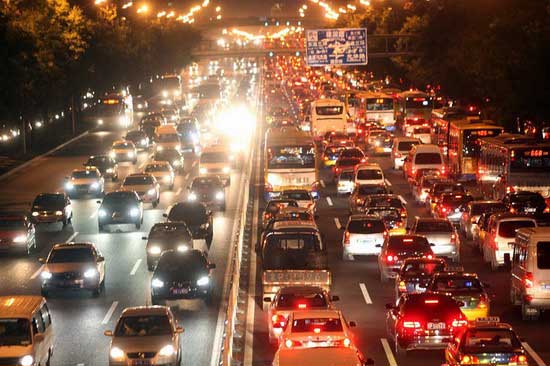Beijing to limit issuance of new car plates
 |
|
Traffic jam in Beijing |
The Beijing municipal government said Thursday it will limit 2011 issuance of new car license plates to 240,000 and implement harsh traffic control measures to ease the city's traffic congestion.
Many Chinese netizens called this the "toughest congestion-tackling measure in history". From Friday, Beijing car buyers will have to draw lots before obtaining a car license plate, said Zhou Zhengyu, deputy secretary-general of the Beijing municipal government.
Private car buyers will receive 88 percent, or 17,600 plates per month on average, of the city's new license plates. Two percent will be for commercial use. The remaining 10 percent will go to company and government institutions and others, Zhou said.
Among those qualified include permanent residents, military servicemen, foreigners, residents of Hong Kong, Macao and Taiwan and those who have no residency status but have paid personal income tax or made social security contributions in the city for at least five straight years.
Also, the Beijing municipal government agencies and public institutions will not increase the size of their motor vehicle fleets during the next five years.
"The number of cars in Beijing has grown quickly as urbanization and modernization progresses. This has caused severe congestions in some downtown areas, especially at rush hour," he added. "Decisive measures shall be taken to control traffic in Beijing. Otherwise, the congestion will only get worse."
In 2010, more than 700,000 news cars were sold in Beijing, bringing the city's total number of automobiles to more than 4.7 million, statistics from the Beijing Municipal Commission of Transport (BMCT) show.
According to the city's regulation, a Beijing driver will be permitted to own only one car in his or her name.
The regulation says car owners who replace their old vehicles will be automatically given new car plates and not have to take part in the lot-drawing.
In order to ease traffic congestion, the regulation also adjusted parking fee standards in non-residential areas. The new standards will take effect from April 1, 2011.
Under the new rules, parking fees inside the 5th Ring Road will be charged per 15 minutes rather than per 30 minutes.
Parking fees in the city will be from 2 yuan to 10 yuan per hour.
Cars registered outside of Beijing will be banned from being driven inside the 5th Ring Road on work days during the rush hours of 7 to 9 a.m.and 5 to 8 p.m.
Beijing could also launch an odd-even license plate number system that allows driving cars on alternate days in rush hours in some congested areas in bad weather, at major events or on important holidays.
The city used the odd-even traffic control measure to ease traffic during the 2008 Olympic Games. Currently, motor vehicles are banned from the roads inside the 5th Ring Road from 7 a.m. to 8 p.m. one work day per week.
Amid others measures, Beijing will also improve city planning, speed the development of some outskirt areas and invest more on public transport.
The new measures will be a blow to car dealerships in Beijing, said Su Hui, a director of the China Automobile Dealers Association.
"Beijing's 450 4S dealerships will have to restructure. Some of them will be forced out of the market, as sales will plunge from about 800,000 annually to 240,000," said Su, a former manager at the Yayuncun Automobile Trade Market, the biggest car dealership complex in Beijing.
Xiong Chuanlin, deputy secretary general of the Association of Automobile Manufacturers, said the restrictions were unfair to potential buyers. The city should, rather, strengthen transport management and regulate vehicle use to tackle traffic jams, he said.
Rumors about the control measures started circulating earlier this month, sparking a car-buying frenzy.
In the past week, car ownership in the city increased by 30,000, BMCT figures show.
At 4 p.m. Wednesday, near the end of the work day, about 100 cars were seen still lining up at a vehicle registration office in eastern Beijing.
A man surnamed Zhao told Xinhua that he was lucky to get his car registered before the new rules come into effect. "Some may have to wait one to two years to get a license plate, given the large population in Beijing and the lot-drawing process," he said.
Zhao acknowledged that he did not need a private car badly, but he bought one ahead of schedule amid worries of possible purchase restrictions.
New car buyer Zhang Lanjie from the northern Inner Mongolia Autonomous Region said she arrived at the vehicle registration office at 6 a.m. before the release of the new measures.
"There should be some measures, otherwise Beijing will become a 'dead city' sooner or later," Zhang said.
"The restrictions, however, shouldn't target non-local residents alone," she said. "Many non-local residents who work and live in Beijing also need motor vehicles."
 0
0 







Go to Forum >>0 Comments